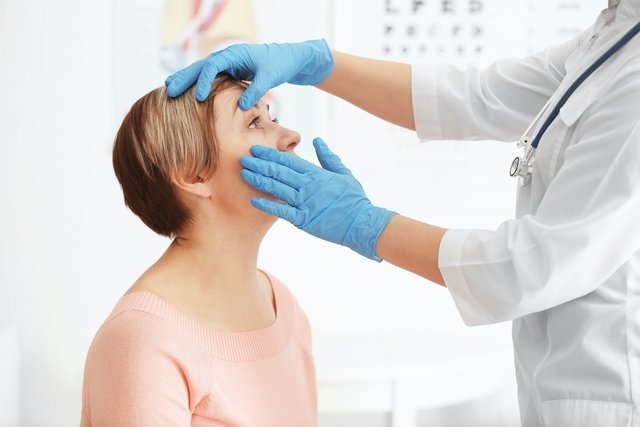Eye allergies can cause symptoms such as red eyes, a burning sensation, itching, watery eyes, swelling, eye pain and increased sensitivity to light, which can occur in just one or both eyes.
Eye allergies, also called ocular allergies, can occur due to the use of makeup that is out of date, contact with animal hair or dust, or due to exposure to cigarette smoke or strong perfume, for example.
To alleviate allergy symptoms, your ophthalmologist may recommend avoiding exposure to the agent responsible for the allergy and using antihistamine eye drops. However, if the symptoms do not improve after using the eye drops, it is important to consult an ophthalmologist for a more detailed evaluation, as this could be a sign of conjunctivitis, which should be treated according to the doctor’s instructions.

Eye allergy symptoms
The main symptoms of eye allergies are:
- Swelling and redness in the eyes;
- Itch;
- Pain around the eyes;
- Tearing eyes;
- Burning in the eyes;
- Greater sensitivity to light.
In addition to eye symptoms, there may also be respiratory symptoms, such as a blocked nose, runny nose and sneezing, for example.
These symptoms are also usually present in the case of conjunctivitis and, therefore, if the symptoms last more than 1 day and do not improve with home measures or the use of antihistamine eye drops, it is important that the person consults an ophthalmologist so that treatment can be indicated. more appropriate treatment. Know how to recognize the symptoms of conjunctivitis.
Online symptom test
Eye allergy is a type of allergic reaction that affects the eye area. To find out if you have an allergy, please indicate the symptoms you are experiencing:
This test is a tool that serves as a means of guidance only. Therefore, it is not intended to provide a diagnosis or replace consultation with an allergist, immunologist or general practitioner.
How the diagnosis is made
The diagnosis of allergy symptoms is made by an allergist or ophthalmologist by evaluating the signs and symptoms presented by the person. In addition, allergy tests can be carried out to investigate the cause of the allergy and thus avoid contact. Find out more about allergy testing.
Make an appointment with your nearest doctor to investigate the cause of the eye allergy:
Taking care of your health has never been easier!
Main causes
The main causes of eye allergies are:
- Use of makeup that is out of date;
- Contact with dog or cat hair;
- Exposure to pollen, dust or cigarette smoke;
- Mofo;
- Very strong smells, such as perfumes and incense, for example;
- Consumption of some foods.
Eye allergies are more common in people who have respiratory allergies, rhinitis or sinusitis.
How the treatment is carried out
Allergy treatment must be guided by an allergist or ophthalmologist, and it is essential that the cause of the allergy is identified so that contact can be avoided or interrupted to alleviate symptoms.
1. Cold water compresses
Cold water compresses are a great option to reduce the stinging, itching and burning sensation in the eyes, and to apply, simply wet a clean gauze pad in cold water and wipe it over the eye, always moving from the inside of the nose to the outside. Each compress should only be used once and the process must be repeated for both eyes.
2. Clean with saline solution
To clean your eyes well using saline solution, you must put a little saline solution in a container and then wet a cotton pad and apply it to the eye. See more home remedies that can be used for eye allergies.
3. Use eye drops
The use of antihistamine eye drops and/or lubricants may also be recommended by the doctor to alleviate symptoms. It may be recommended to use antihistamine eye drops twice a day, or as directed by your doctor, to promote symptom relief.
In the case of lubricating eye drops, application may be recommended a few hours after using antihistamine eye drops, to keep the eyes hydrated and reduce irritation. Find out more about the uses of eye drops.
Bibliography
- BRAZILIAN COUNCIL OF OPHTHALMOLOGY. Eye allergies: prevention as the basis of treatment. Available at: <https://www.cbo.net.br/novo/publico-geral/alergias-oculares–a-prevencao-como-base-do-tratamento.php>. Accessed on Aug 26, 2020

Sign up for our newsletter and stay up to date with exclusive news
that can transform your routine!
Warning: Undefined array key "title" in /home/storelat/public_html/wp-content/plugins/link-whisper-premium/templates/frontend/related-posts.php on line 12
Warning: Undefined array key "title_tag" in /home/storelat/public_html/wp-content/plugins/link-whisper-premium/templates/frontend/related-posts.php on line 13



